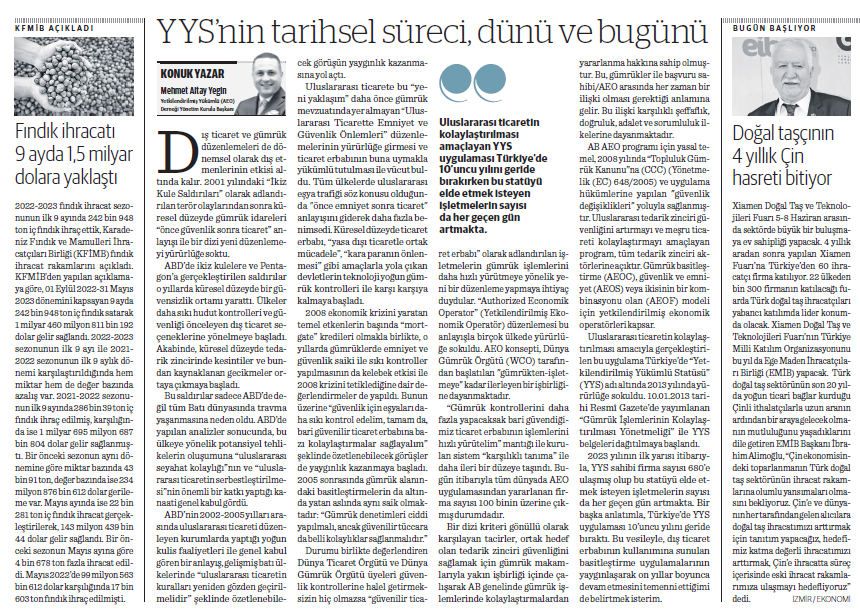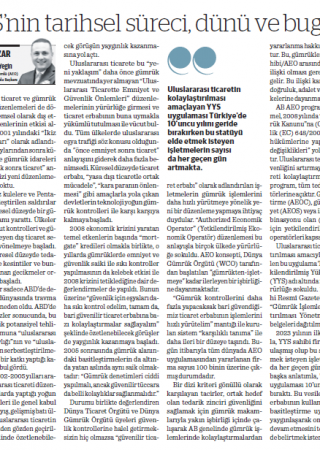Our Board Chairman, Mehmet Altay YEGİN's article titled Historical Process Yesterday and Today of AEOS was published in the newspaper named as "Nasıl Bir Ekonomi". Mehmet Altay Yegin Board Chairman of the Authorized Economic Operator (AEO)

Foreign trade and customs regulations are also periodically affected by external factors. After the terrorist attacks in 2001 called the "Twin Tower Attacks", customs administrations at the global level put in place a number of new regulations with the understanding of "security first, then trade".
The attacks on the twin towers and the Pentagon in the United States created a global insecurity environment in those years. Countries are turning to foreign trade options that prioritize tighter border controls and security. Subsequently, supply chain disruptions and resulting delays began to occur at the global level.
These attacks caused trauma not only in the United States but throughout the Western world. As a result of the analyses conducted in the USA, it was generally accepted that "ease of international travel" and "liberalization of international trade" contributed significantly to the formation of potential dangers for this country.
A generally accepted understanding with the intensive lobbying activities of the USA in the institutions that regulate international trade between 2002-2005 has led to the spread of the view that can be summarized as "the rules of international trade should be reconsidered" in developed western countries.
This "new approach" to international trade was established by the entry into force of the "Safety and Security Measures in International Trade" regulations, which were not previously included in the customs legislation, and the obligation of the trade professional to comply with this. When it comes to international goods traffic in all countries, it has increasingly adopted the concept of «safety first, then trade». At the global level, the world of trade has begun to face technology-intensive customs controls of states that set out for purposes such as "joint fight against illegal trade" and "prevention of black money".Although "mortgate" loans were one of the main factors that created the
2008 economic crisis, it was also evaluated that the security and security motive and strict controls at customs in those years triggered the 2008 crisis with the butterfly effect. Thereupon, opinions such as “let's control the goods more tightly for security, okay, but let's at least provide some facilitation to the reliable merchant” began to gain popularity. After 2005, the simplifications in the customs area are actually the same: “Customs inspections should be done seriously, but certain facilities should be provided to the reliable trader.”
The members of the World Trade Organization and the World Customs Organization, evaluating the situation together needed to make a new regulation to carry out customs procedures faster for businesses called "reliable trade professionals", at least without prejudice to security checks. The “Authorized Economic Operator” regulation has been implemented in many countries with this understanding. The concept of AEO is based on a cooperation initiated by the World Customs Organization (WCO) from «customs to business».
The system, which was established with the logic of "If we are going to carry out more customs controls, let's carry out the transactions of the trade worker we trust quickly", has been taken to a further level with "mutual recognition". As of today, the number of companies benefiting from AEO application has increased to over one hundred thousand all over the world.
Merchants who voluntarily meet a set of criteria have the right to benefit from facilitations in customs clearance across the EU by working closely with customs authorities to ensure supply chain security, which is a common goal. This means that there should always be a relationship between customs and the applicant/AEO. This relationship is based on the principles of mutual transparency, truthfulness, justice and responsibility.
The legal basis for the EU AEO programme was provided in 2008 through the «safety amendments» to the "Community Customs Code" (CCC) (Regulation (EC) No. 648/2005) and its implementing provisions. The program, which aims to increase international supply chain security and facilitate legitimate trade, is open to all supply chain actors. Customs simplification (AEOC) covers economic operators authorized for the safety and security (AEOS) or a combination of the two (AEOF) model.
This practice, which was carried out for the purpose of facilitating international trade, was put into effect in 2013 under the name of "Authorized Obligor Status" in Turkey. AEOS documents started to be distributed with the "Regulation on Facilitation of Customs Procedures" published in the Official Gazette dated 10.01.2013.
As of the first half of 2023, the number of AEOS-owned companies has reached 680, and the number of enterprises seeking to achieve this status is increasing day by day. In other words, the AEOS application in Turkey has passed its 10th year. On this occasion, I would also like to state that I hope that the simplification practices offered to the use of foreign trade professionals will become widespread and continue for decades.

